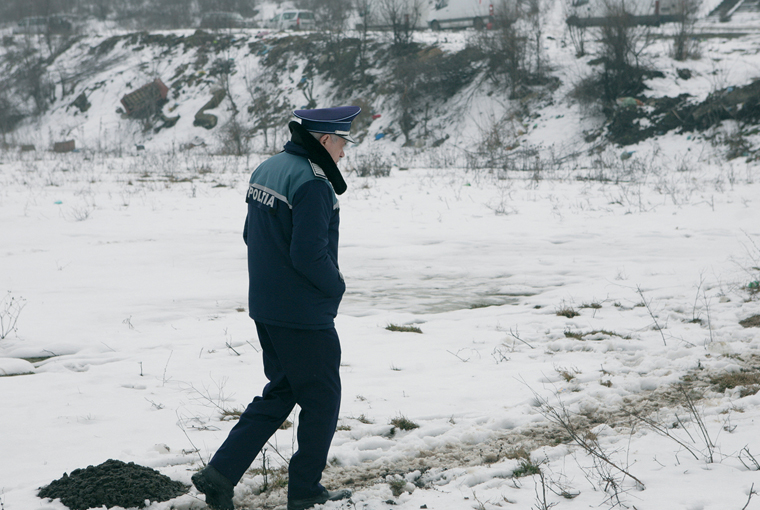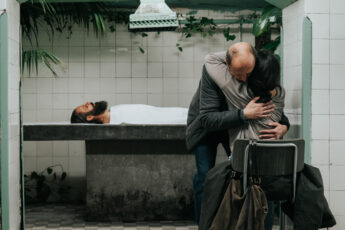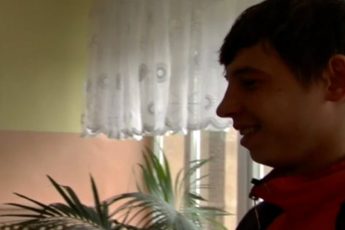Plumbing the Depths of Police Conduct. Again!
Cătălin Mitulescu’s Heidi (2019)
Vol. 97 (September 2019) by Lucian Tion
It’s now been a few years since critics have begun debating whether the Romanian New Wave is dead or very much alive, and Cătălin Mitulescu’s latest film, Heidi, which had its world premiere at the Sarajevo Film Festival, is not about to settle it. If Adina Pintilie was the latest Romanian filmmaker to make a splash with her rather controversial Touch Me Not, which won the Berlin Bear in 2018, nothing since at least Călin Netzer’s Child Pose could be said to distinctly belong to that proprietary aesthetics that defined the wave of early films like Cristi Puiu’s The Death of Mr. Lazarescu and Cristian Mungiu’s 4 Months, 3 Weeks, and 2 Days.
While Heidi certainly belongs to the haptic cinematic style that gave us these films—it was shot on meditative 16mm in the wintry suburbs of Bucharest—it seems to lack a certain je ne sais quoi in terms of plot. What happens in Heidi? Briefly, the film is about a romantic attachment between an older policeman and a prostitute, and in that it constitutes an original, if somewhat predictable, premise that nevertheless belongs to the despondent societal dramas that Romanian cineastes have already made famous. Moreover, the film’s exploration of social morality, which Mitulescu probes with Heidi, screams for a comparison with Corneliu Porumboiu’s critically acclaimed Police, Adjective, inasmuch as the theme of ethical conduct in a post-Socialist environment wrought with corruption is concerned. For these reasons, the film is unmistakably New Wave. However, a certain indecision seems to loom large over Mitulescu’s effort. While both the cop and the prostitute are convincingly drawn and endearingly played by veteran actor Gheorghe Visu of Socialist-era fame and promising newcomer Cătălina Mihai, the screenplay hesitates in the crucial moment of resolution of an otherwise powerful conflict created between the cop’s sense of duty and his personal desire.
What grips our interest for the entire duration of the film (and the actors as well as the screenplay are to be credited for that) is the chemistry created between the two protagonists, partly because the situation depicted is extremely realistic. Mitulescu’s honesty allows characters to be developed beyond the tempting clichés that the premise invites, and this doesn’t only make Vișoiu-the-cop and Heidi-the-prostitute believable, it also makes them interesting. In this sense, Gheorghe Visu takes his Vișoiu one step further than Vlad Ivanov did his emblematic cop of said Police, Adjective fame. Vișoiu and Heidi indeed live out their short romance in front of our eyes for those minutes of screen time we see them together (which are not excessive) with the naturalness that experience and youthful élan allow, but also the range which Mitulescu’s script permits them. Heidi, moreover, convinces because of a certain playfulness and roughness that are not only specific to the character, but specific to something that is both more eternally feminine and tragically human.
It is, however, Mitulescu’s over-confidence in the ability of the characters to “make” his film happen that is to be faulted here for the restrained reception of the film at this year’s edition of the Sarajevo Film Festival. The problem with Mitulescu’s writing reflects, moreover, an inability of this director to overcome a certain blockage that characterized all his films since his strong 2006 debut, How I Spent the End of the World, a film detailing the tribulations of a couple caught in the mire of the Romanian Revolution. Since then, neither his self-indulgent Loverboy (2011) nor his more recent By the Rails (2016), which were the only films he directed in this time span, were able to demonstrate the full scale of this director’s talent, a talent Mitulescu undoubtedly has. It is as if, even though his subject matter is invariably appropriate for the cinema he wants to make, Mitulescu has a problem dotting the ‘i’s of his scripts, failing to add his otherwise detectable personal style to the stories he masterly leads toward a resolution that is never fully delivered. And this is a shortage that keeps him from finally graduating to the rank that other Romanian directors like Radu Jude, Corneliu Porumboiu, and Cristi Puiu belong to.
What is worth praising in Heidi, however, is the film’s ability to maintain a barely detectable though highly intoxicating tension which dominates the plot until just before the finale. This tension further reflects on Romanian society at large, and in that, it references an altogether New-Wave-identifiable property of Romanian cinema to hold a mirror to the intricate web of relationships that (still) makes both this society and style unique. What is being referenced is the continuous inability of society to overcome post-Socialist transition that condemns its characters to live in a seemingly perpetual no-man’s-land between past and present, between East and West.
Mitulescu’s characters are endearingly portrayed as inhabitants of this interstitial space. Heidi is neither a product of trafficking nor entirely independent, as she is implicated in an enigmatic series of misdemeanors that tie her down to a dangerous underground of crime. Visoiu, for his part, takes his nephew fishing, yet he has to cut short their trip because of work. Moreover, even though he buys his daughter a traditional shirt from the market, the shirt ironically doesn’t fit. And on top of it all, he is committed to helping the police solve the case by extracting information from Heidi, yet falls in love with her. He is neither the righteous family man he knows he is supposed to be while on the verge of retirement, nor the unscrupulous and ethically dubious character that both Netzer and Mungiu have previously made famous with the help of Vlad Ivanov’s performances. What we see (and are completely immersed in) with Mitulescu is precisely this twilight zone between winter and spring and humanity and depravity that so wonderfully captures the spirit of post-Socialist Romanian society and cinema.
Be that as it may, this also draws negatively on the institution of the police in a post-Socialist Eastern European environment in which art emulates life, and vice versa. While it is true that Mitulescu’s drama comes on the heels of a very tragic crime in which police non-intervention led to the murder of a little girl in a town not too remote from the one from which fictional Heidi hails, it is a coincidence that the real-life murder and Mitulescu’s premiere were more or less concomitant. What is not a coincidence, however, is that the topic of police conduct returns on the working tables of Romanian writer-directors with increasing regularity. This might mean that beyond the attractiveness of the genre and the usual character appeal of such dramas, there is genuine interest—possibly even general desire at the societal level—that something should indeed change in a much too apathetic Eastern Europe. And if Heidi were to indeed help institute change, this would be a first for a Romanian New Wave film, brooding darkness and pessimism notwithstanding.
In that, Mitulescu’s efforts did not go to waste. A little more determination, however, and a sturdier hand at the helm inasmuch as scriptwriting is concerned, would ensure that Mitulescu turns out not the self-indulgent dramas he has been making, but the slightly more biting ones which he could easily make if only he were inclined to do so.




Leave a Comment